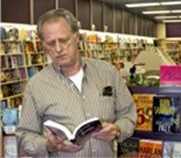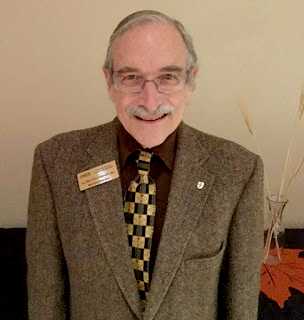| MAIN WEBSITE ABOUT Thanks for Noticing: The Interpretation of Desire | | INDEX to these selections of sonnets + commentary | | The book's Introduction -- Luke Guillory Welsh | | Sonnet 54 -- Patrick Neas, Geneva Blackmer | | Sonnet 78 -- The Rev Dr David E Nelson | | Sonnet 84 -- The Rev Anton K Jacobs, PhD |
#54
Jump to the comment by Patrick Neas on this sonnet:
54. Barcelona: Scrawl
Renunciation is not enough. You must act.
Yet action mustn’t dominate you. In the heart of action,
you must remain free from all attachment.
They told me to take a street-car named Desire, . . .
and ride six blocks and get off at—Elysian Fields!
Desire actually started across the street . . .
to hear what Love might have to say.
YOU agonize and call me Krishna; walk
three times Las Ramblas and decide to yield
to rouge. Or pride in not. Your choice, such talk,
such sin, such vision of the battlefield!
Then humble when you held me late that night
in my pure yearning bed I now recall,
when in us trust and sleep could reunite,
field’s rounded rest, now feint in this traced scrawl:
Like Gaudí’s spires, this troth erects your touch
above the ground, though of the ground, the field
of faith. I quivered in your sky-filled clutch.
and wondered how it happened you were healed.
O Fields of Being, O Grounds of Praise,
O Arrows of Desire, make dance each phrase.
_____________________________________
The EPIGRAPH is from Peter Brook’s production of the Hindu epic, the Mahabharata, of which the Bhagavad Gita is the famous scripture in which Krishna as god advises Arjuna entering the field of battle. E2: from the Tennessee Williams 1947 play, A Streetcar Named Desire, Act 1. E3: from James Baldwin’s 1983? “Guilt, Desire, and Love.” Gaudí designed Sagrada Familia basilica, a UNESCO World Heritage Site, in Barcelona. Under construction since 1882, the spires were, I found in 1994, terrifying to ascend. Theologian Paul Tillich called God the ground of being; see his 1951 Systematic Theology, v1, p238. A remote physical analogy is the Higgs field which gives mass to fermions. Las Ramblas is a Barcelona district of temptations where rouge cosmetics suggests prostitution. Feint/faint: feint means sham; faint means faded, timorous, unfounded, or a swoon. Sin: In Puccini’s La fanciulla del West, Minnie declares una suprema verità d’amore: fratelli, non v’è al mondo peccatore cui non s'apra una via di redenzione! — “a supreme truth of love: brothers, there is no sinner in the world to whom a path of redemption does not open!" Quiver is a pun. Arrows of Desire: from the Preface to William Blake’s 1804 Milton,
often called “Jerusalem,” sung as a patriotic hymn written in 1916 by
Anglican Hubert Parry. Also think of the arrow in Bernini’s St Teresa.
#54Neas
NEAS COMMENT ON 54. "Barcelona: Scrawl"
The Glory of the Gita, Gaudí and God Liberated
Vern Barnet, who has expanded my mind in so many ways over the
years, has been especially enlightening when it comes to the
concepts of NeoBaroque and Postmodernism. Vern’s collection of
sonnets, Thanks for Noticing: The Interpretation of Desire, provides rich examples of both.
My reading of Postmodern philosophy is limited, and my knowledge of
its concepts is very basic. My impression is that it is skeptical of
accepted truths and of the distinctions between so-called high and
low art. Michael Daugherty’s Metropolis Symphony, which depicts
various episodes in Superman’s life, seems to me to be a Postmodern
work, with its combination of lowbrow comic strip and highbrow
symphony.
I thought that Postmodernism doesn’t make judgments about works of
art; but when I asked Vern about this, he said this is incorrect.
“Postmodernists are willing to make judgments, but they always say
these judgments are not free of cultural prejudice or disposition,”
Vern told me. “And the difference between the Postmodernist and the
Modernist is that the modernist thinks that you can make a judgment
free of cultural predisposition.”
The way Vern sets so many disparate cultural references side by side
in prolific footnotes strikes me as Postmodern, but Vern disagrees.
“I think that's just modern,” he said. “Think about T.S. Elliot,
who's certainly a Modernist. In 'The Wasteland,' his early poem of
fame, he draws upon all sorts of things, Greek, Latin, German,
Sanskrit. But he's definitely a Modernist. So Modernists are not
always bad guys. Modernists do recognize diversity.”
The first thing that comes to mind when I think of NeoBaroque is
Stravinsky’s ballet Pulcinella, which is his Modernist
arrangement of music by various Italian Baroque composers. I think
of NeoBaroque as being ornamental and curlicue in matters of design
and thought, like the films of Federico Fellini or the writing of
Jorge Luis Borges.
Likewise, the lavish and engrossing footnotes which Vern provides
for Thanks for Noticing have a baroque extravagance.
“The elaborate apparatus of epigraphs and glosses could easily be
considered rather dense ornamentation of the sonnet itself,” Vern
pointed out. “Shakespeare, a Renaissance writer, displays
characteristics of the Baroque. He sometimes ornaments his sonnets
with the repetition of a word in various forms in each part of the
sonnet, each of the three quatrains and the couplet. This sonnet of
mine plays with various forms of the word field within the
same four-part placement: battlefield, field's, field, Fields.
Part of the pleasure of NeoBaroque art is discovering such
repetitions."
The role of the viewer is important in both PostModernism and
NeoBaroque, as in Thanks for Noticing.
“My sonnets, like many poems, require the reader's engagement to
construct the reader's own experience and interpretation; but unlike
many poems, the demands (or various opportunities) I make are
extraordinary in their complexity,” Vern said.
For a trivia hound like myself who loves going down Wikipedia rabbit
holes, Vern’s footnotes are a veritable treasure trove. He says the
notes and epigraphs are meant to be like the program notes at a
classical concert, which help set the music in historical context
and shed light on its composition.
“Reading one of these sonnets is like meeting a stranger with a
friend,” Vern says. “If you want, you can skip the friend's
introduction, the epigraphs, and meet the stranger directly by
speaking the sonnet aloud. But if you want to know the stranger's
background, consider the notes and the glosses that follow. There
are people who have read my stuff and like to read the notes first,
which is sort of getting a bio before you meet the new person.”
The notes for all of Vern’s sonnets are replete with wide-ranging
cultural references. For "Barcelona: Scrawl," the notes reference
Gaudi’s Sagrada Familia basilica, the Bhagavad Gita, a Tennessee
Williams play, and an opera by Puccini. If, as Vern says, this is an
introduction to a new friend, it is a highly cultured and spiritual
friend.
The sonnet opens with three epigraphs, the first a quotation from
the Bhaghavad Gita about renunciation. They are words that the
charioteer Lord Krishna spoke to Pandava Prince Arjuna on the
battlefield just as the Kurukshetra war between the Pandavas and
Kauravas was about to break out.
“The advice that Krishna gives Arjuna is to act without attachment
to the fruit of the act,” Vern says. “And what that means is that
all we can do is what is set before us, given the circumstances, to
do our duty, but not worry about the consequences. And the reason
that's important is we never can know what the ultimate consequences
of what we do is going to be anyhow. We're not in ultimate control.
Krishna or God or the universe is ultimately going to determine
that; we do not bear the weight of the universe on our shoulders.
All we can do is the best we can do.”
For Vern, as for me, the other highlight of the Gita is when Prince
Arjuna requests that Krishna allow him to see Krishna’s universal
form as the cosmic universe.
“Arjuna receives a manifestation of the full nature of Krishna,”
Vern said. “And there's this awe inspiring -- one might even say
horrible -- revelation of the way the universe works, which includes
the horrors of wars and disasters as well as the delights of love
and beauty. All of that is part of the universe.”
Vern says that this God is a revelation of the universe and the way
things work, and that's very unlike the Western notion of an
all-loving God.
“This revelation is both beautiful, awesome, and horrible,” Vern
says. “And learning to accept that, and loving the opportunity to be
alive in all of its agony and bliss makes for a full life of
affirmation.”
It’s curious, and maybe even a little jarring that "Barcelona" Vern
opens with one of the most important Hindu scriptures, but then the
second epigraph is taken from A Streetcar Named Desire,
Tennessee Williams’ steamy play about Blanche DuBois and Stanley
Kowalski. Also injecting a note of eroticism is the reference to Las
Ramblas (La Rambla in Catalan), Barcelona’s most important
thoroughfare filled with shops and religious institutions, but near
the harbor end of the street, a red light district.
“So you have this place of sexual temptation in one part of the city
and in another part of the city, you have this world heritage site
of Sagrada Familia,” Vern said. “You have a tremendous contrast in
Barcelona and that feeds into the background for the sonnet. I think
some people, especially with the reference to Las Ramblas and the contrast with the sweetness of the experience of
the companions together in bed, might see it as a contest between
temptation of sexual attraction with a love imbued with a kind of
transcendent loyalty.”
The third epigram, from James Baldwin, makes this match between
desire and love explicit.
Vern has structured Thanks for Noticing after the liturgy
of the Mass. "Barcelona," which Vern calls a “sonnet of bliss,” is,
appropriately, in the Gloria section of the book. Although
"Barcelona" seems to be based on personal experience, Vern says the
sonnet does not necessarily depict an actual event.
“In my view, poetry is a revelation of an experience, not a news
report,” Vern says. “So this is not a literal transcription of an
event. It's more important for the poem to expose something
transcendent rather than to record an incident. I'm not just
fudging, I’m staking out a principle of interpreting poetry.”
Whether referencing the Gita, Tennessee Williams, or Baldwin, or
causing us to ponder our place in the cosmos, Thanks for Noticing
has a mind-blowing richness that, like the best writing, will reward
rereading and contemplation.
For
more than 20 years, PATRICK NEAS was program director and morning show
host for Kansas City’s classical radio station, KXTR. Since 2009, he has
written the weekly Classical Beat column for The Kansas City Star. His
work appears in Classical Post, KC Studio and other publications. He
also writes program notes for Guarneri Hall in Chicago and is proud to
have been editorial assistant for Binding Us Together: A Civil Rights Activist Reflects on a Lifetime of Community and Public Service by Alvin L. Brooks.
#54Blackmer
BLACKMER COMMENT ON 54. Barcelona: Scrawl
Liberated from Judgments
In “Barcelona: Scrawl,”
Barnet invites us to abandon all dualistic thoughts and attachments
that inevitably hinder us from encountering both our beloved and the
Divine. These socially constructed divisions, entangled with false
notions of the self, act as barriers to the most basic desire to know and be known.
Barnet dances with the futility of such efforts, as the subject of the
sonnet considers the consequences of yielding to their temptations,
observing that one cannot be liberated from consequence, only from
judgments.
As the speaker later finds oneself in a bed of “pure
yearning,” Barnet seems to point to the yearning of a mystic -- the
type of yearning which unites the sacred and the sexual in a moment of
transcendence beyond the ordinary possibilities of our finite reality.
Eliminating attachments around desire allows for the act to become a
mirror; it is in this space alone that the mystic finds perfect union
with the Divine.
This “troth,” arising from both temptation and
the bed, points now “above the ground, though of the ground, the field
of faith.” For Paul Tillich, the “ground of being” is not a state which
is confined by time and space, but rather encompasses the entire
structure of meaning and aim of existence. Humanity’s ultimate concern
is the ultimate to which it belongs, cannot be separated from, and
continually longs for, but is disrupted by time and space. This
“ground” can move between cause and substance because it transcends
both.
In the end, the sonnet inevitably arrives at the natural conclusion of transcendent experience -- a hymn of praise.
Thanks for Noticing: The Interpretation of Desire
offers a profound invitation to immerse ourselves more deeply and
intimately in love, in ourselves, our relationships, God, and the
world. It challenges the separatism of the sacred in the West,
revealing the Divine in even the most ordinary of human experiences.
I
would argue that the fate of humanity deeply rests in our willingness
to embark on this journey; how fortunate for us, that Barnet has opened
the door and illuminated the path.
GENEVA BLACKMER, MA,
MESt, writes from the University of Bonn where she is a research
assistant in the Department of Intercultural Theology. In 2025, she
receives her PhD in Interdisciplinary Studies in the
Department of Theology at Amridge University. Internationally, she is a
Global Council Trustee, North America, for the United Religions
Initiative. Her work in this country includes an internship with
CRES, and positions with the North American Interfaith
Network, The Interfaith Council of Southern Nevada, The Interfaith
Center at Miami University, and several other local and regional faith
organizations. She is the founder of The Kansas City Interfaith
History Project.
GURLEY COMMENT ON 54. Barcelona: Scrawl
I'm impressed by its formal elegance.
George
H. Gurley, Jr. grew up in Kansas City where he attended
Pembroke-Country Day for high school. He graduated with high honors in
English from Princeton University in 1963, then taught at International
College in Beirut, Lebanon for a year. He returned to Kansas City and
worked in real estate as president of Preferred Properties for 20 years. In
1983, he went to work for the Kansas City Star. He wrote three “general
interest” columns a week for ten years and was the book review editor
for seven years. Two of his plays were produced by Park College,
directed by Pulitzer Prize winner Charles Gordonne. His poems have been
published in literary magazines such as Poetry and New Letters. The
Wall Street Journal has published his book reviews. Raindust Press
published a book of his poems, “Home Movies". BkMk Press published a
book of his poems, “Fugues in the Plumbing” and a book of newspaper
columns (with Peter Simpson), “Press Box and City Room.” After retirement from the Star, he wrote a column for the Lawrence, Kansas Journal World for
15 years. He and his wife, Susan, have four children – George H. Gurley
III, Arian van Newkirk, Cern Van Newkirk and Gillian Gurley.
George and Susan live on a farm in rural Douglas County where they have
been restoring the native prairie under the Wildlife Habitat
Improvement Program.
#78
Jump to the comment by David Nelson on this sonnet:
78. Advent
Haec enim omnia signa carnis, quae a terra sumta est,
quam in se recapitulatus est, suum plasma salvans.
YOU chose the bench with me to worship Him
this Advent Sunday, readying our souls
for His new birth; we venture on time’s rim,
our thews made free by ancient swaddled scrolls.
You grasped my hand and valid held it strong;
then to the rail we went and supped with Christ,
the sacred feast that makes all sorrow song
when to His table we are thus enticed.
In skin he vests: God comes to us on earth,
as He was born a mortal like us two.
A stable was His place of sated birth;
a tree makes art, this tract of troth, the pew.
What is beyond mere plat and plot is thus —
the Mass begets his humble flesh in us.
The
Irenaeus (130?-202) EPIGRAPH is from “Adversus Haereses” (Against the
Heresies), 3:22:2: “For all these are tokens of the flesh which have
been derived from the earth, which he had epitomized in Himself,
disposing salvation to his own handiwork.” Advent Sunday is the first Sunday of the Christian liturgical season of preparation for Christmas, the nativity of Jesus. Bench is another word for pew, usually made of wood, as was the cross, the tree on which Jesus was sacrificed. Communion may be received at a rail after bread and wine become the sacrament of the body and blood of Jesus the Christ through their consecration on the holy table.
“At the end of the Twelfth Century a Latin theologian, Berengarius of
Tours, was condemned for his teaching on the Eucharist. He maintained
that because the presence of Christ in the Eucharist elements is
‘mystical’ or ‘symbolic,’ it is not real. The Lateran Council . .
. condemned him and . . . simply reversed the formula. It proclaimed
that since Christ’s presence in the Eucharist is real, it is not
‘mystical.’ . . . Western theology thus declared that . . . [the]
‘mystical’ or ‘symbolic’ is not real, whereas . . . [the] ‘real’ is not
symbolic. This was . . . the collapse of the fundamental Christian mysterion,
the antinomical ‘holding together’ of the reality of the symbol and of
the symbolism of reality, . . . a collapse of . . . Christian . .
. ontological sacramentality.” —Alexander Schmemann, 1963/1973 For the Life of the World: Sacraments and Orthodoxy,
p128-129. Alas, then, for those like Wittgenstein who, during the war,
“saw consecrated bread being carried in chromium steel. This struck him
as ludicrous.” —Lectures & Conversations on Aesthetics, Psychology,
and Religious Belief (n.d., LCCN 66-19347), p53. Vests: A priest, sometimes regarded as an image of Christ, wears vestments. Thews means muscle or sinew, hence bodily strenth. Art:
“No one is more tire�some than the person who can . . . never . . .
believe anything . . . unless it appears to be real. One must be
willing to allow that symbolic things also mirror realities . . . .”
—Aaron Cope�land, 1939/2011 What to Listen for in Music, p179.
#78commentNelson
COMMENT on 78. Advent: What is Real?
Advent
has always been a day and a season when my imagination kicks into high
gear. As a child it had more to do with hanging stockings and
wrapping presents to place under a decorated tree in the living room.
Becoming a student of theology I learned a deeper meaning of waiting
and celebrating the wonders of incarnation. My intellectual
understanding continues to change as the years add up, but the gift and
wonder of imagination never wanes. Next Advent, as a senior
citizen, I want to be more like that child and allow my imagination to
soar. Imagination is the ability to create mental images,
concepts, and ideas that are not present in our immediate sensory
experiences. It allows me to visualize possibilities
beyond what is currently known or understood. Advent someday,
as I am led or supported toward the altar rail to taste the bread and
drink the wine, may allow me to ignore arguments about “real presence”,
“sacrament or symbol”, “mystical or real” and look into the Eucharistic
mirror and see the Sacred wink back at me. --The Reverend Dr David E Nelson
#84
Jump to Anton Jacob's comment on this sonnet:
84. Postmodern Faith: What is Truth?
My God, is this a dagger that I see?
Am I observing actors in a play?
Is this a dream or film of tragedy?
or just computer games where I’m to slay
with it? Perhaps I’m high on LSD
or wearing VR glasses that display
an archetype if not a snickersnee.
Is this getik, menok, or Judgment Day?
Oh no, no dagger but Christ’s cross, that tree
which bares illusions in one Truth, one Yea!
It tears and it repairs reality
and wakes us to attend and watch and pray.
I know the Gospel is a pious tale,
but who grabs facts when worship cannot fail?
Pilate put the question to Jesus; John 18:38. Perhaps anticipated by the ancient Jain teaching of anekantavada, the doctrine of multiple viewpoints, Jean-François Lyotard described Postmodernism as “incredulity toward meta-narratives” such as theological systems or myths regarded as literal reality. In the 1957 Opus Posthumous: Poems, Plays, Prose,
p163, Wallace Stevens wrote, “The final belief is to believe in a
fiction, which you know to be a fiction, there being nothing else. The
exquisite truth is to know that it is a fiction, and that you believe
it willingly.” W H Auden wrote, “It is as meaningless to ask whether
one believes or disbelieves in Aphrodite or Ares as to ask whether one
believes in a character in a novel; one can only say that one finds
them true or untrue to life. To believe in Aphrodite and Ares merely
means that one believes that the poetic myths about them do justice to
the forces of sex and aggression as human beings experience them in
nature and in their own lives.” The client following a therapist’s
suggestion to “place your father in this chair and tell him how you
feel” may appear little different from one who prays. Religion is more
about commitment than certainty. Perhaps Vico (1710) anticipated
Postmodernism with his Verum factum principle: truth is not observed; it is constructed. The first line derives from Shakespeare’s Macbeth, 2, 1, “Is this a dagger which I see before me?” An exquisite example of the problem of distinguishing dream from reality is portrayed in the Illustration to the Second Prose Poem on the Red Cliff by Qiao Zhongchang (Northern Song Dynasty, 960-1127) at the Nelson-Atkins Museum of Art in Kansas City, MO. LSD is a psychedelic or entheogenic drug. VR
is Virtual Reality. Key terms from pre-Islamic Iranian thought
reinterpreted in the epistemology of Suhrawardi (1155-1191), “Sheikh
al-Ishraq,” the Master of Illumination, are getik (the ordinary world) and menok (a heavenly realm, perhaps akin to Plato’s realm of forms, or archetypes as in the New Testament’s Hebrews). Judgment Day cf «Love Locket». The Christian Gospel includes the crucifixion and resurrection of Jesus the Christ, a figure paralleled in other religious traditions. A snickersnee is a large knife that can be used for fighting. Tree: cf «Barren Golgotha». Facts: “We are poor passing facts” —Robert Lowell, “Epilogue,” Day by Day, 1977. Samuel Taylor Coleridge, 1817 Biographia Literaria,
XVI: wrote of the “willing suspension of disbelief for the moment,
which constitutes poetic faith.” This sonnet uses only three end-rimes.
#84comment
COMMENT on 84. Postmodern Faith: What is Truth?
On Knives: Vern Barnet’s ‘Postmodern Faith: What is Truth?’
Knives…. Dr. Vern Barnet’s sonnet titled, “Postmodern Faith: What is
Truth?” plays with metaphors of the knife. It begins with a quote from
Shakespeare’s Macbeth, “My God, 'is this a dagger that I see?'”
Raising questions pertinent to perception and conception, from LSD to
VR (that might mirror archetypes), Barnet wonders if a snickersnee is
displayed. Towards the conclusion of the sonnet, he takes us to
“Christ’s cross” as no dagger but nevertheless as an instrument that
“tears and…repairs reality,” thus waking “us to attend and watch and
pray.”
Every seeing is a seeing from some angle, and for human becomings, that
is always and unavoidably conditioned by time and place in history and
culture. One of postmodernism’s patron saints is Friedrich Nietzsche
(Cahoone calls him “the godfather of postmodernism”), who argued that
there are no facts, only interpretations, and that perspectivism is the
only way to see. “Henceforth, my dear philosophers,” writes Nietzsche,
“let us be on guard against the dangerous old conceptual fiction that
posited a ‘pure, will-less, painless, timeless knowing subject’; let us
guard against the snares of such contradictory concepts as ‘pure
reason,’ ‘absolute spirituality,’ ‘knowledge in itself’: these always
demand that we should think of an eye that is completely unthinkable,
an eye turned in no particular direction, in which the active and
interpreting forces, through which alone seeing becomes seeing
something, are supposed to be lacking; these always demand of the eye
an absurdity and a nonsense.” When we seek to freeze life in this
manner, argues Nietzsche, it is a type of revenge on life.
In other words, the quest for the one, pure, objective, correct,
absolute, incontestable truth—metanarrative––a quest characterizing the
history of much of Western philosophy, religion, and more—is a fool’s
quest. Lyotard’s concern reflected the historical atrocities, which
social critics from the Frankfurt School to postmodern thinkers saw as
culturally rooted in the West’s drive for the one perfect, timeless,
and unchallengeable truth, a drive that went on secular steroids during
and after the Enlightenment in dialectical relationship with the
priorities of capitalism’s instrumental reason. As Lyotard states, “The
nineteenth and twentieth centuries have given us as much terror as we
can take. We have paid a high enough price for the nostalgia of the
whole and the one, for the reconciliation of the concept and the
sensible, of the transparent and the communicable experience.” As I
have written elsewhere, “Postmodernism is a highly varied movement of
the last sixty years that promotes the idea that all human knowledge is
relative to its historical and cultural context, and that modernism’s
attempts to find the one true and rational blueprint for organizing
human life has been misguided and contributed to some of the horrors of
the twentieth century.”
If I understand the
argument of Max Horkheimer and Theodor Adorno, the dialectic of Enlightenment on
the cultural level between secular reason, on the one hand, and
religious faith and mythology, on the other, resulted in the demise of
religious mythology and its bastardization into fundamentalism and
consequently to the disenchantment of life, the world, and the
universe. However, that very triumph of Enlightenment reason in service
to the alienating structures of bourgeois priorities resulted in a new
mythological faith with a legitimation of domination and alienation.
This has resulted in a dehumanizing world in which individuals measure
themselves according to their monetary worth, while feeling controlled
by powers of which no one appears in charge. Among the results are
increased vulnerability to the resentments thereof which make fertile
ground for fascism.
Another intellectual
development of the nineteenth and twentieth centuries with some
likeness to postmodernism was carried, primarily first, by the pioneer
anthropologists and then deeply cultivated by what I’d call the
metamythologists. These are the likes of Mircea Eliade, Joseph
Campbell, Alan Watts, William Irwin Thompson, to a lesser extent Carl
Jung and followers, and many others. Their cross-cultural
investigations and correlations of humanity’s mythologies have helped
us get away from the narrow and sometimes violent provincialisms and
dogmatisms of so much of the world’s religions to appreciate the
challenging and liberating aspects of nature’s and culture’s marks of
transcendence. “An experience of transcendence has always been part of
the human experience,” writes Karen Armstrong, and she echoes Campbell
when she writes, “A myth…is true because it is effective, not because
it gives us factual information.” In a footnote for a different sonnet,
Barnet writes that “a myth is a story that reveals the nature and
structure of sacred reality.” It might not be wrong to suggest that the
metamythologists and postmodernists, each in their way in their
respective venues in modernity’s alienated cultural segmentations, have
been doing much the same thing. They have sought to contribute to the
liberation of souls and bodies from the unnecessary spiritual and
material brutalities of the societies of human becomings. These are not
minor objectives.
Barnet has fruitfully mined
the canons of the metamythologists, whom he cites regularly, even
having studied under Eliade. They serve him well for his, if you will,
sonnetical remythologizing of human desire, including its erotic and
mystical drives that, I think he suggests and, if so, I agree, cannot
be separated. They come to us as two-edged swords, though, as mystics
and lovers have always discovered. The ecstasies of human love and of
mystical union are always shadowed by their opposites—whatever you want
to call them at any given time—heartbreak, tragedy, loss, alienation,
dark night, fear, anxiety, terror. Which brings us back to the dagger
of Christ’s cross. “Indeed,” writes the unknown author of the Christian
epistle to the Hebrews, “the word of God is living and active, sharper
than any two-edged sword, piercing until it divides soul from spirit,
joints from marrow; it is able to judge the thoughts and intentions of
the heart.” At their best, so it seems to me, that is the project of
the metamythologists and postmodernists alike. They exegete and
deconstruct and interrogate to tear and repair human existence and open
up to us the authentic realities of the thoughts and intentions of our
hearts; and, perhaps, in the process, alongside the Gospel’s “pious
tale,” waking “us to attend and watch and pray.”
The cornerstone, still, of any discussion of postmodernism, and which Barnet cites in a footnote, is Jean-François Lyotard’s
statement, “Simplifying to the extreme, I define postmodernism as
incredulity toward metanarratives.” However, the common core of
postmodern sentiment is the insight that there really is no escape from
an angle of seeing. Ironically or paradoxically, this insight at the
center of postmodern thought is true of postmodernism itself. Defining
postmodernism is near impossible, which the leading postmodern
advocates acknowledge and probably embrace. Postmodernism is “contested
terrain between moderate and extreme postmodernists,” notes Stephen
Best and Douglas Kellner, referring to complete ultraskeptics and
relativists, on the one hand, and, on the other, to those still in
pursuit of constructs on which to do philosophy and social critique in
light of that understanding that we cannot stand nowhere. Simply
stated, there is no ultimately objective and infallible blueprint that
can be imposed on reality or society without violence and atrocity.
Armstrong, Karen.
A Short History of Myth. Edinburgh: Canongate, 2005.
Barnet, Vern. Thanks for Noticing: The Interpretation of
Desire. Kansas City, MO:
La
Vita Nuova Books, 2015.
Best, Steven, and
Douglas Kellner. The Postmodern Turn. New York & London:
The Guilford
Press, 1997.
Lawrence Cahoone,
ed. From Modernism to Postmodernism.
2nd ed.
(Oxford, UK: Blackwell Publishing, 2003).
Horkheimer, Max,
and Theodor W. Adorno. Dialectic of
Enlightenment.
Translated by
John Cumming. N.Y.: The Seabury Press, 1972 [1944].
Jacobs, Anton K. “Postmodernism.”
In The Sage Encyclopedia of the Sociology
of Religion, vol. 2. Edited by Adam Possamai and Anthony J. Blasi, 598-599.
Los Angeles: Sage Reference, 2020.
Lyotard, Jean-François.
The Postmodern Condition: A Report on
Knowledge.
Translated by
Geoff Bennington and Brian Massumi. Theory and History of Literature.
Vol. 10. Minneapolis:
University of Minnesota Press, 1984 [1979].
Nietzsche, Friedrich.
Twilight of the Idols and The Anti-Christ. Translated by
R.J. Hollingdale. London: Penguin, 1968 [1889,
1895].
Nietzsche, Friedrich.
On the Genealogy of Morals. Translated by Walter Kaufmann
and
R. J. Hollingdale. N.Y.: Vintage; Random House, 1967 [1887]), 119.
Nietzsche, Friedrich.
The Will to Power. Translated by Walter Kaufmann and
R. J. Hollingdale. N.Y.: Vintage; Random House, 1967 [1901]. Radnitzky, Gerard. Contemporary Schools of Metascience. Chicago:
Henry Regnery Co., 1973.
--Anton K. Jacobs, Ph.D., Instructor, Kansas City Art Institute Author of Religion and the Critical Mind; My Country, My Faith, & Me; and a few other things. |
#Luke
On the Introduction to
Thanks for Noticing: The Interpretation of Desire
by Vern Barnet
Commentary by Luke Guillory Welsh
Read the draft PDF Foreword and Introduction to the book here.
It’s
rare to find desire, the sacred, and playfulness in the same room
together. Vern Barnet has them intertwined on the couch in Thanks for
Noticing, exploring the raw material of love and sex while
simultaneously taking the reader through a rich tour of many of the
world’s great faith traditions. Sounds enlightening? Fun? Even daring?
It is.
The Introduction serves as an exposition and an
education on the themes displayed in the 154 poems — God, play,
imagination, transformation, union, and indeed, desire. It also guides
the reader through seeing the sonnet as an art form which, much like
desire, has the potential to lead to transcendence. The collection
considers desire as an expression of the soul’s yearning to know and be
known by the Beloved, burned up and utterly transformed by Love’s fire.
Barnet states that writing these sonnets “has been like praying, a way
of discovering the shape of yearning, from petty selfishness to a
vision of larger love, offering my longing, perplexities, and
rejoicings to the Larger Context, and realizing where I am resisting or
yielding to the Flow.” The Introduction formally initiates the reader
into both the sonnet and a broad interfaith perspective where desire is
sacred.
The Sonnet, Laid Bare
In
his Introduction, Vern Barnet offers to the reader an accessible, rich
understanding of the sonnet: its history including Shakespeare’s
mastery of it, its structure and variations, and the interior
principles and technical devices employed in verse. And in the sonnet
Barnet has found a fitting chalice to uplift his soul’s outpouring.
“Just as, for Ibn Arabi (the Muslim mystic and poet), God is pronounced
by the gift of Imagination, so Poetry spells, entrances, and spills
forth the higher Reality implicit in the appearance each creates for
oneself and of the Friend.” Poetry, Barnet asserts, has the potential
to co-create Reality, to conceive of sacred transformational unions,
through creative and sensuous language. Because poetry is meant to be
read out loud, poetry transforms how the listener relates to, and is
capable of, experiencing oneself and the Divine. And the play of poetry
dances with desire, which is another word for Imagination.
The
poetic form and the sentiment are intimately related, heightening the
meaning of each other. Again, Barnet is able to draw parallels between
the co-creating of form and sentiment with God and Creating coming to
know and be known by one another. As for the Sufi mystic, surrender (‘fana in Arabic) paradoxically leads to revival and even union (baqa)
with the Divine, so the form’s parameters create the conditions for its
own transcendence. The listeners are immersed into the river of many
intimate faces of desire that are shaped by the earthen banks of the
sonnet. The journey through the Introduction itself brings one to
a new vantage point, sharpening the mind whilst perhaps softening and
expanding the heart so that the voyage through the poems may transform
the listener.
Sexuality (Sensuality, Desire?) as Sacred:
The Culture, The Mystics
To talk about desire, and our experiences of it, requires considering
how cultures and religions have fragmented sexuality, often limiting
the acceptable spectrum of human emotions and emotional expression.
Barnet calls out the severance of spirituality from our sexuality,
stating that in our “so-called Christian culture sometimes appears to
sever our sexual joys from the spirit.” For many Christians, even
talking about or thinking about sexual desire is taboo, one enforced
with shame and clouded in silence. It’s no surprise that so many young
married Christian couples report struggling to overcome their negative
emotions associated with their sexuality, with shame like a wet blanket
smothering feelings of arousal and intimacy. These restrictions to our
permitted wonder, Barnet argues, shape and direct our attention with
fragmented and depersonalized prejudices. This he calls the trance of
secularism, for which beholding the world in awe is the cure.
But
love is natural and universal; it is our birthright to embrace everyone
and everything. And while some sects steer toward repression, there has
always been the undercurrent of direct experiential universal love in
the mystical strains of many faiths. Barnet, in his Introduction and
his poetry’s substantial footnotes, asserts that our desire is a Call
to engage the Beloved, a heightening affirmation of the sacredness of
desire. Barnet asks, “Why should sexual arousal and satisfaction in
themselves be insufficient to kindle profound thanksgiving?” By
considering the full spectrum of our desires as a part of God’s
creation, to feel their calling, ecstasy, their propelling us to and
through life, is a gift worthy of profound thanksgiving, Eespecially if
you don’t judge it. Barnet provides a refreshing affirmation of the
mushy, messy, burning, yearning dimensions of our tender human
experience through his poetry, and his introduction makes the case for
embracing the full range of human emotion (including our desires and
even the sexual ones).
Fragmentation and the Reunifying Salve of Desire
Through
these sonnets, sex is particularly valorized as an arena of the holy, a
reclamation of our natural human birthright as part of what is. What
keeps us from the divine is where we are split off, fractured, and
fragmented, from ourselves. This shapes how we are with others,
and ultimately affects how we relate to God. Rumi started the equation
from the opposite end, saying “the way you make love is the way God
will be with you.” To love requires vulnerability, surrender, something
as dangerously scary as it is ultimately affirming, because
vulnerability is that edge where we are open to truly connect with one
another.
And there’s the point. In a world
fragmented and broken, the forms of desire “such as imagination,
appetite, interest, curiosity, fascination, and yearning, bring us to
encounter ourselves, others, and the world - personhood, community,
nature.” Mystical traditions emphasize intimate communion, the personal
relationship, with the Beloved, with Life in all Its many forms. To
love the world, not in some detached and impersonal sense, but to feel
deeply and passionately for it, inspires awe for nature, others, and
self, which prompts care and service. Barnet’s role toward this end is
to elevate sensation and experience, to offer a reframing that affirms
the spectrum of human experience as Life-affirming. “My aim, like
mystics in many faiths, is to transform and refresh secular, sacred,
and even vulgar language into the lexicon of holy love.”
It begs
the listener. In what ways would the rapture of experience (as noticed
in the sexual realm) carry over and refresh the eyes through which we
see one another, our communities, and our place in nature? How might
responsibly honoring desire bring us into sacred union and give us
newfound appreciation for life and mature into service? These are the
questions Barnet has set out to answer, not by speculating from an
armchair, but by allowing his desires to come and take form in these
sonnets.
Conclusion
There is gratitude from the first word with Thanks for Noticing,
realizing the lover is one who adores life. This sentiment was so
beautifully captured by St. John of the Cross when he wrote “Tenderly,
I now touch all things, knowing one day we will part.” Often in
Barnet’s intimate poems, the one beheld is another man, sometimes
parallel to Shakespeare’s “young friend”. Other times the Barnet the
lover (Barnet) seems more zealous for God, overflowing with thanks.
There
will doubtless be readers who will find the reunification of sex and
spirituality as a bridge too far. Others may appreciate Barnet’s
cross-cultural exploration of sex and the sacred, but still feel that
worshiping the body, as it were, while comparing cathedrals to anuses,
belongs in the private domain. Central to Barnet’s work is the notion
of Beholding, or knowing one intimately as God “yearned to be known”
according to the Muslim hadith. How can we Behold in such a way that we
are completely enraptured with the other? It is where (and how) we
direct our energy that creates our reality.
It is the spark of
desire that drives people forward in family life, on career paths, and
toward personal fulfillment. Imagine what might be possible were the
hearts of lovers kindled our awe to soothe the crises of our world. How
might we be changed by that love? Barnet is one such courageous
example, as his life and work attests.
Luke Guillory Welsh
November 28, 2023 |
|
 DAILY
PRACTICE
DAILY
PRACTICE VERN
ROMANTIC F***ER MYSTIC
VERN
ROMANTIC F***ER MYSTIC from
Comment added to YouTube video
from
Comment added to YouTube video
 PULITZER
PRIZE
PULITZER
PRIZE
 In
a note at the bottom of a poem he writes: “God’s playful delight is to
behold us, to know us as we are, beyond human moral criteria. Similarly,
when we love without need, intention, agenda, compulsion, claim, judgment,
or dependency, but simply love by noticing, by witnessing, by beholding,
loving freely as God does, we become like God. (Pg. 101)
In
a note at the bottom of a poem he writes: “God’s playful delight is to
behold us, to know us as we are, beyond human moral criteria. Similarly,
when we love without need, intention, agenda, compulsion, claim, judgment,
or dependency, but simply love by noticing, by witnessing, by beholding,
loving freely as God does, we become like God. (Pg. 101)
 Vern
Barnet has long been one of the outstanding religious leaders of Kansas
City. The accompanying picture was taken of him at the 2016 Annual Interfaith
Community Thanksgiving Dinner, held for the first time on the campus of
William Jewell College.
Vern
Barnet has long been one of the outstanding religious leaders of Kansas
City. The accompanying picture was taken of him at the 2016 Annual Interfaith
Community Thanksgiving Dinner, held for the first time on the campus of
William Jewell College.